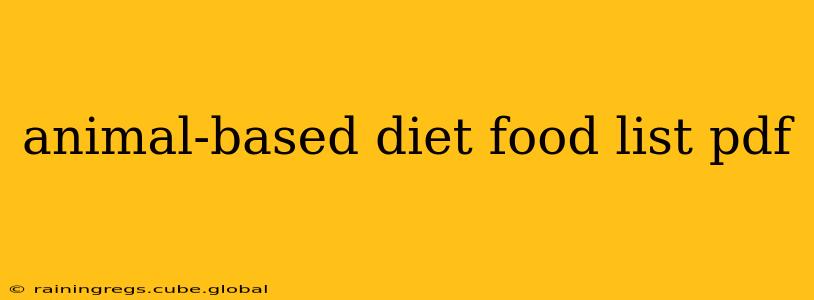The Ultimate Animal-Based Diet Food List: A Comprehensive Guide
An animal-based diet, also known as a carnivore diet or a zero-carb diet, focuses primarily on animal products, excluding plant-based foods. This approach varies in strictness; some allow limited dairy or eggs, while others adhere strictly to meat, fish, and organ meats. This guide provides a comprehensive food list suitable for various interpretations of an animal-based diet, emphasizing nutrient density and variety. Remember to consult your doctor before making significant dietary changes.
Understanding the Nutritional Pillars of an Animal-Based Diet:
The core of a successful animal-based diet lies in consuming nutrient-rich foods to ensure you meet your daily requirements for protein, essential fatty acids, vitamins, and minerals. This diet should not be considered a "junk food" diet consisting solely of processed meats; rather, it emphasizes whole, unprocessed animal products.
I. Meat:
- Red Meat: Beef (grass-fed is preferred), bison, lamb, venison. Consider various cuts for different nutritional profiles and culinary applications. Leaner cuts are good for everyday meals, while fattier cuts offer more flavor and essential fatty acids.
- Poultry: Chicken (bone-in is preferable), turkey, duck, goose. Look for pasture-raised options to enhance nutrient content.
- Pork: Pork chops, pork loin, bacon (choose nitrate-free options whenever possible).
II. Seafood:
- Fatty Fish: Salmon, mackerel, sardines, tuna (wild-caught is ideal), herring. These are excellent sources of omega-3 fatty acids.
- Shellfish: Shrimp, lobster, crab, oysters, clams, mussels. Provide a different micronutrient profile compared to other seafood.
III. Organ Meats:
- Liver: (Beef, chicken, or other sources). Exceptionally nutrient-dense, rich in vitamins A and B12.
- Kidney: A good source of iron and other minerals.
- Heart: A lean protein source, offering various vitamins and minerals.
- Brain: Rich in choline and other essential nutrients. (Note: Consumption of brain tissue should be carefully considered, especially if sourcing independently.)
IV. Eggs:
- Chicken Eggs: Pastured or free-range eggs offer the highest nutritional value, including choline and various vitamins.
- Duck Eggs: Larger and richer in nutrients compared to chicken eggs.
V. Dairy (Optional, depending on the dietary interpretation):
- Full-Fat Dairy: This includes whole milk, butter (grass-fed preferred), cheese (hard cheeses like cheddar or parmesan offer longer shelf life), cream, and yogurt (full-fat, unsweetened). Note that dairy is often excluded in stricter forms of the animal-based diet.
VI. Bone Broth (Highly Recommended):
Bone broth, simmered from animal bones, provides valuable minerals like collagen and gelatin, contributing to gut health and joint support.
VII. Considerations for an Animal-Based Diet:
- Sourcing: Prioritize high-quality, ethically sourced, and preferably organic meats and seafood.
- Variety: Consuming a variety of animal products ensures a broader spectrum of nutrients.
- Nutrient Density: Focus on nutrient-rich options, prioritizing whole, unprocessed foods.
- Hydration: Drink plenty of water.
H2: Frequently Asked Questions About the Animal-Based Diet
H3: Is an animal-based diet safe?
While generally safe for healthy individuals, it's crucial to consult a healthcare professional before starting this diet. They can help assess your individual nutritional needs and ensure the diet aligns with your health status. A balanced animal-based diet will offer a broad spectrum of nutrients, but deficiencies can occur if not carefully planned.
H3: Will I get enough fiber on an animal-based diet?
The fiber content in an animal-based diet is naturally lower compared to plant-based diets. Bone broth and organ meats offer some contribution, and some may choose to include things like bone marrow, but fiber intake will generally be minimal.
H3: What about vitamins and minerals?
A well-planned animal-based diet can meet vitamin and mineral requirements, particularly if organ meats are included. However, regular monitoring by a healthcare professional is recommended to ensure adequate levels are maintained. Supplementation might be considered in some cases.
H3: Are there any potential downsides to an animal-based diet?
Potential downsides include the risk of nutrient deficiencies if not planned carefully, higher saturated fat intake (depending on choices), and potential high cholesterol levels (again, food choices play a big role). Consulting a healthcare professional is vital to mitigate these risks.
Disclaimer: This information is for educational purposes only and should not be considered medical advice. Consult a healthcare professional before making any dietary changes. This is not an exhaustive list, and individual needs may vary.
